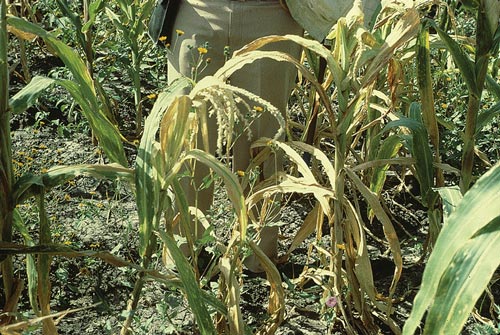 “Maize is Africa’s most important cereal crop, with more than 300 million of Africa’s most vulnerable people depending on it for their food security and livelihoods,” says B.M. Prasanna, director of CIMMYT’s Global Maize Program. “The emergence of maize lethal necrosis in eastern Africa has dealt a big blow to farming communities and maize-based seed companies.” Maize lethal necrosis (MLN) infection rates and damage can be very high, seriously affecting yields and sometimes causing a complete loss of the crop. Infected plants are frequently barren; ears may be small or deformed and set little or no seed. “There is no maize farmer in the whole of Nyakinywa area in Kaplamai division [Kenya] who has been spared by the disease, which is a danger to food security,” said area chief Francis Morogo in April 2013 in an interview with the Daily Nation newspaper.
“Maize is Africa’s most important cereal crop, with more than 300 million of Africa’s most vulnerable people depending on it for their food security and livelihoods,” says B.M. Prasanna, director of CIMMYT’s Global Maize Program. “The emergence of maize lethal necrosis in eastern Africa has dealt a big blow to farming communities and maize-based seed companies.” Maize lethal necrosis (MLN) infection rates and damage can be very high, seriously affecting yields and sometimes causing a complete loss of the crop. Infected plants are frequently barren; ears may be small or deformed and set little or no seed. “There is no maize farmer in the whole of Nyakinywa area in Kaplamai division [Kenya] who has been spared by the disease, which is a danger to food security,” said area chief Francis Morogo in April 2013 in an interview with the Daily Nation newspaper.
Control of MLN is complicated by the fact that it is caused by a combination of two viruses that are difficult to differentiate individually based on visual symptoms. In the past two years, studies undertaken jointly by CIMMYT and KARI have confirmed the vulnerability of most pre-commercial and commercial maize germplasm to MLN under natural disease pressure as well as under artificial inoculation. However, promising CIMMYT inbred lines and pre-commercial hybrids with resistance or moderate resistance to MLN have been identified, which offers considerable hope to combating the disease through breeding efforts.
Together, CIMMYT and KARI are now planning to establish a centralized MLN screening facility for eastern Africa at the KARI Livestock Research Farm in Naivasha to facilitate reliable screening of maize germplasm and deliver MLN-resistant varieties to replace existing susceptible cultivars as quickly as possible. “Besides accelerated development and delivery of elite MLN-resistant products to farmers, our aim is also to build the capacity of regional institutions for developing robust breeding pipelines to incorporate MLN-resistant germplasm, and ensure that farmers have access to such products at the earliest opportunity,” Prasanna adds.
The CRP MAIZE will be hosting a side event on the role of maize in Africa at the Africa Agriculture Science Week (15-20 July) on 16 July in Accra, Ghana. Join us if you can and follow the AASW Blog and #AASW6 on Twitter.
 Nutrition, health and food security
Nutrition, health and food security